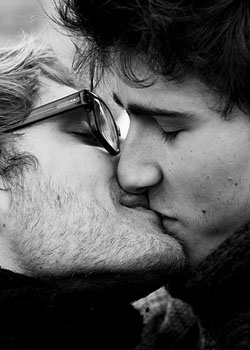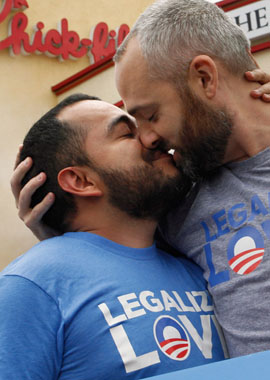It is not new that we hear, see or face situations in which commercial establishments prohibit a kiss, a peck or gestures of affection from same-sex couples.
Recently, a gay couple was attacked after exchanging a kiss at the Sukyia restaurant, on Rua Augusta. Another was prohibited from giving a peck at the Extra hypermarket, in the Aricanduva shopping mall, in São Paulo.
Thinking about it, the THE CAPE asked the lawyer Thales Coimbra, specialist in LGBT law, gave tips and alternatives to face prejudice from security guards, businesspeople (…) when we go out as a couple.
Thales states that the restaurant can prohibit certain behaviors within the space and that it even has the right to select its clientele – charging a lot or requiring certain attire – but that it cannot have discriminatory requirements based on gender identity and sexual orientation.
In other words: "If the restaurant doesn't want gay kisses, it will also have to prohibit heterosexual kisses, otherwise discrimination will be incurred."
– What should I do if a security guard comes to say that I can’t kiss my boyfriend, husband or partner in the establishment?
– Ask to speak to the person responsible for this order. Never, under any circumstances, argue with security. In addition to not solving anything, you will only heat up your head, running the risk of being attacked.
– Before speaking to the manager, try to document this conversation, using audio and/or video, as well as witnesses – after all, you don’t want to be attacked by the manager either.
– When speaking to the person in charge, mention your rights and say that the requirement is illegal. If he insists, tell him that you will have to call the police.
– Do this, look for witnesses who are on your side and be very patient, as state agents are not always trained to deal with cases of discrimination. Remember that you did nothing wrong and stay calm.
– If the incident occurs on business days and during business hours, you can call DECRADI (Hate Crime and Intolerance Police Station) on 3311-3555.
 – What if I feel cornered?
– What if I feel cornered?
Never be naive enough to do it alone or without recording what is happening. This way you put your integrity at risk for nothing. Find someone to accompany you and record everything. Preferably, do it hidden, as you don't want to provoke the attacker's anger. I say again, never waste your time with people who won't solve anything. Go speak directly to the person responsible for the establishment.
– In case of physical or moral aggression, who can I turn to?
Always go to the police. Regardless of whether homophobia is a crime or not, you are a person who has been attacked and they have a duty to help you. As I said before, if the attack occurred on working days and during business hours, you can call DECRADI (Hate Crime and Intolerance Police Station) on 3311-3555.
– Can an establishment ask gay customers not to kiss in the space?
The restaurant may prohibit certain behaviors within its premises, after all, no one is forced to eat here or there. Furthermore, he has the right to select his clientele, for example, by charging a lot or demanding an outfit like this or that. At the Jockey Clube de SP, for example, men don't enter without pants.
What cannot be done, however, are illegal demands, that is, those that violate the law, for example discriminatory demands based on gender identity and sexual orientation. If the restaurant doesn't want gay kissing, it will also have to prohibit heterosexual kissing, otherwise it would incur discrimination.
– What is the penalty for a restaurant that has a discriminatory stance and action?
In the case of gay kissing, article 2, item VIII, of state law no. 10.948/2001 classifies discrimination against gay couples as an administrative offense. The penalty for a commercial establishment ranges from a simple warning to a fine (ranging from 20 to 60 thousand reais) and can go as far as suspension or revocation of the state operating license.
This does not exclude a civil action for compensation for moral damages, nor a criminal action, as the conduct constitutes a crime against the consumer (Refusal of service), whose penalty varies from 2 to 5 years, in accordance with article 7 of Law no. . 8.137/1990.
 – Of the cases that become public and that reach you, do people take any legal action?
– Of the cases that become public and that reach you, do people take any legal action?
People tend to seek my legal assistance. However, few people actually follow through on the process and this is for numerous reasons. There are people who simply want to forget what happened, but are mistaken in believing that not taking any action will help. You are putting dirt under the carpet and this could have psychological consequences in the future, as it is an unresolved problem. There are people who don't have the money to hire a lawyer or simply have other priorities at the moment. Everyone knows what bothers them most. And there are people who are not even aware of their own rights.
– How important is the complaint?
When they seek justice, they are not just solving a personal problem, but a problem that plagues us all. And if the victim gives up seeking their rights, they legitimize the system that exists today, in which LGBT people live in fear. After all, the attacker knows that she can do whatever she wants, because no one will do anything.



